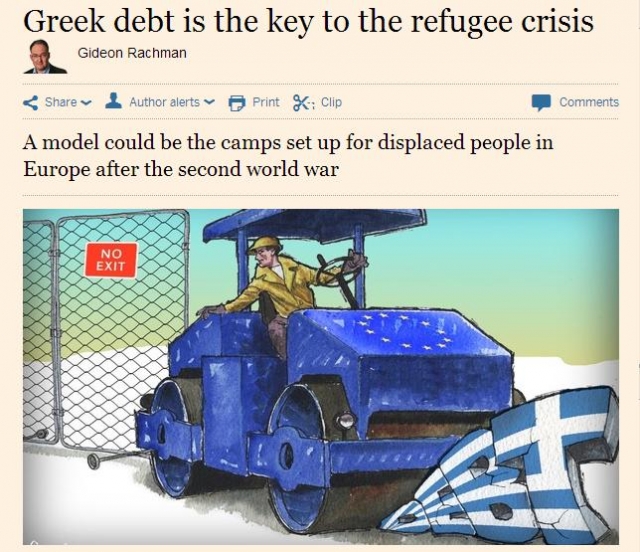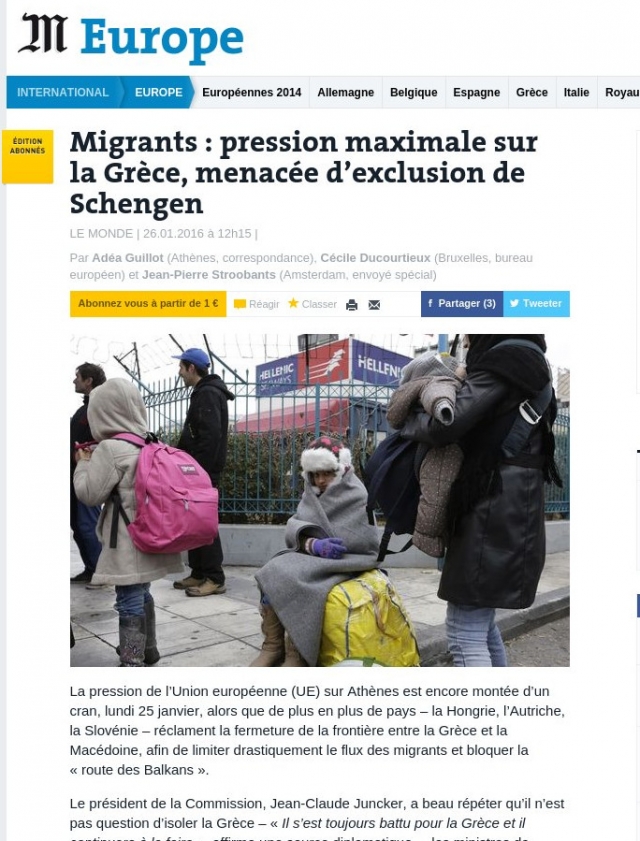Photo: kathimerini.gr
The European Commission supports Macedonia’s position towards Greece in relation to the refugee problem, as is clear from a letter that its Chairman Jean-Claude Juncker has sent to the Prime Minister of Slovenia. In it, he states that refugees should stay in Greece rather than making their way to Germany.
The magazine Politico that has a copy of the letter has disseminated the information and the publication clarifies that Juncker supports the Slovenian proposal on reinforcing the Macedonian - Greek border with European aid, so that the refugee influx to northern Europe is interrupted.

According to this plan, most of the refugees arriving in Greece would stay in place in order to alleviate both the transit countries and those that are their final destinations, namely Germany and Austria.
"I welcome your suggestion," Juncker wrote to the Slovenian Prime Minister. The plan also stipulates that all European countries should help Macedonia by providing law enforcement authorities and equipment. Accounting for the fact that the country is not an EU member, the European Commission President indicates that the member states should sign bilateral agreements with the Macedonian government to allow the deployment of police forces on the border with Greece.
The Greek media point out that the particular development is coming at a time when Athens is subject to harsh criticism on the part of Austria and Germany that have warned that the country could be excluded from the Schengen zone if it did not make greater efforts to guard its northern and southern borders.
Earlier today, the Greek Deputy Minister for Migration Yiannis Mouzalas said that at yesterday's meeting in the Netherlands, Belgium’s Minister of Foreign Affairs suggested that a camp for 400,000 migrants be set up in Athens. In statements to Skai TV, Mouzalas did not hide his concern over the refugee crises developments associated with Greece.
"The Schengen agreement is in jeopardy throughout Europe. It is in danger and in fear. I am concerned about it. The situation is serious for our country," he said.
Meanwhile, the Financial Times international economic magazine has published an article by a leading commentator, Gideon Rachman. In it, he states that it is time for Europe and above all Germany to deal with the two main problems of the EU, namely the economic and refugee crisis, simultaneously and in a constructive manner.

The proposal is as follows: Greece should close its borders with EU support in order to be able to stop the refugee influx to northern Europe. In return for this, Germany should approve a significant writedown of the huge Greek debt.
According to the author, "EU officials are known to be considering ‘ringfencing’ Greece by blocking the border between Greece and Macedonia, which is the main route north." Rachman states, "This plan is believed to have support in Berlin."
Commenting on the article, the Greek Deputy Minister for Migration said, "Turning our country into Europe’s prison and place of exile in return for payment is outrageous." Mouzalas added, "There are issues and we should be vigilant. The key to reducing the influxes is in Turkey. The European Commission must work intensively with Turkey for their reduction (...) All in the European Union agree to it."
According to the Greek news website skai.gr, in October 2015 the German magazine WirtschaftsWoche published information on the presence of an idea of Germany reducing its financial requirements to Greece if Athens agreed to keep large numbers of refugees on its territory. The magazine cited sources from the German government.

Meanwhile, the French daily Le Monde has reported that the College of Commissioners will discuss at tomorrow's meeting a plan for Greece’s expulsion from the Schengen zone for a period of two years. According to the publication, if such a decision were taken, the procedure would be as follows: The European Commission would assess the current situation of the Greek-Turkish border, which is also the external border of the Schengen zone. Then it would submit its report for consideration by the European Council summit. It must be approved by a qualified majority to be accepted.
Greece would have three months to tackle the problem. If the guarding of external borders of EU continued to be considered unsatisfactory after the period expired, the Commission would submit a proposal to terminate the Schengen agreement for two years and to activate the internal border controls by the other member states.
The publication of Le Monde also indicates that the current activities are aimed at closing the Greek-Macedonian border, combined with granting economic aid to Skopje in parallel.